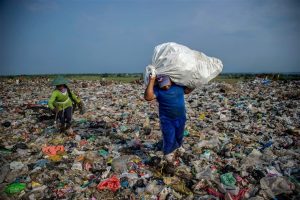
China has for many years been the plastic recycling waste dump center for the world with way over 2000 million tons previously imported on a yearly basis. That is about 45 percent of the world’s plastic waste. But in 2017, China decided to stop importing almost all recyclables.
The country itself is a huge user of plastics even without the imports with its population using plastic bags with reckless abandon according to the Daily Dose making it responsible for 28 percent of the world’s plastic pollution on its own aside from all previous imports. Also, up until now, all garbage receptacles which had separate slots for ‘general waste’ and ‘recycling,’ didn’t make a difference because all waste went into the same bag and then dumped together.
Besides the Chinese government’s ban on imported recycling plastics, it is ramping up its efforts to deal with its own mountain of waste. A few companies like Bull House, owned by Carrie Yu are educating and encouraging China’s citizens to be more environmentally responsible. Yu is passionate about the benefits of a zero-waste lifestyle and talks to people about their purchasing habits particularly in the use of plastics.
The ban of at least 99 percent in reduction of imported plastic recyclables of course created a void in the country’s plastic processing industry. In one province, in Shandong province in the city of Binzhou, an industrial cluster of companies producing blankets, carpets and converter belts and more use plastic waste bottles to manufacture its products.
To fill the void from the ban, the Chinese government has been focusing on responsibly processing the mountains of plastic waste produced domestically.
Part of the plan includes a pilot program involving 10 undisclosed zero-waste cities. Control will be tight regarding purchasing habits, sales of single-use plastics, and the implementation of recycling infrastructures. These ten cities will hopefully be used as a blueprint for the rest of the country beginning in 2020. Officials say they hope to encourage people to live environmentally friendly lifestyles and minimize waste.
The world panicked of course when China closed its doors to importation of plastic waste and looked to other areas and countries to dump it. But those countries are also looking to end or cut back on imported plastic recycling waste. The world needs to follow China’s lead in taking responsibility of using its own plastic waste and not look for new places to dump it.
